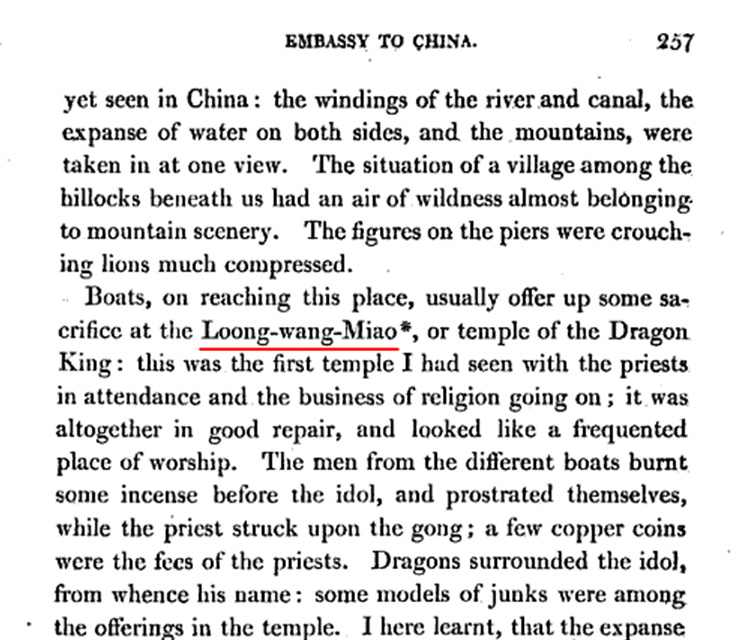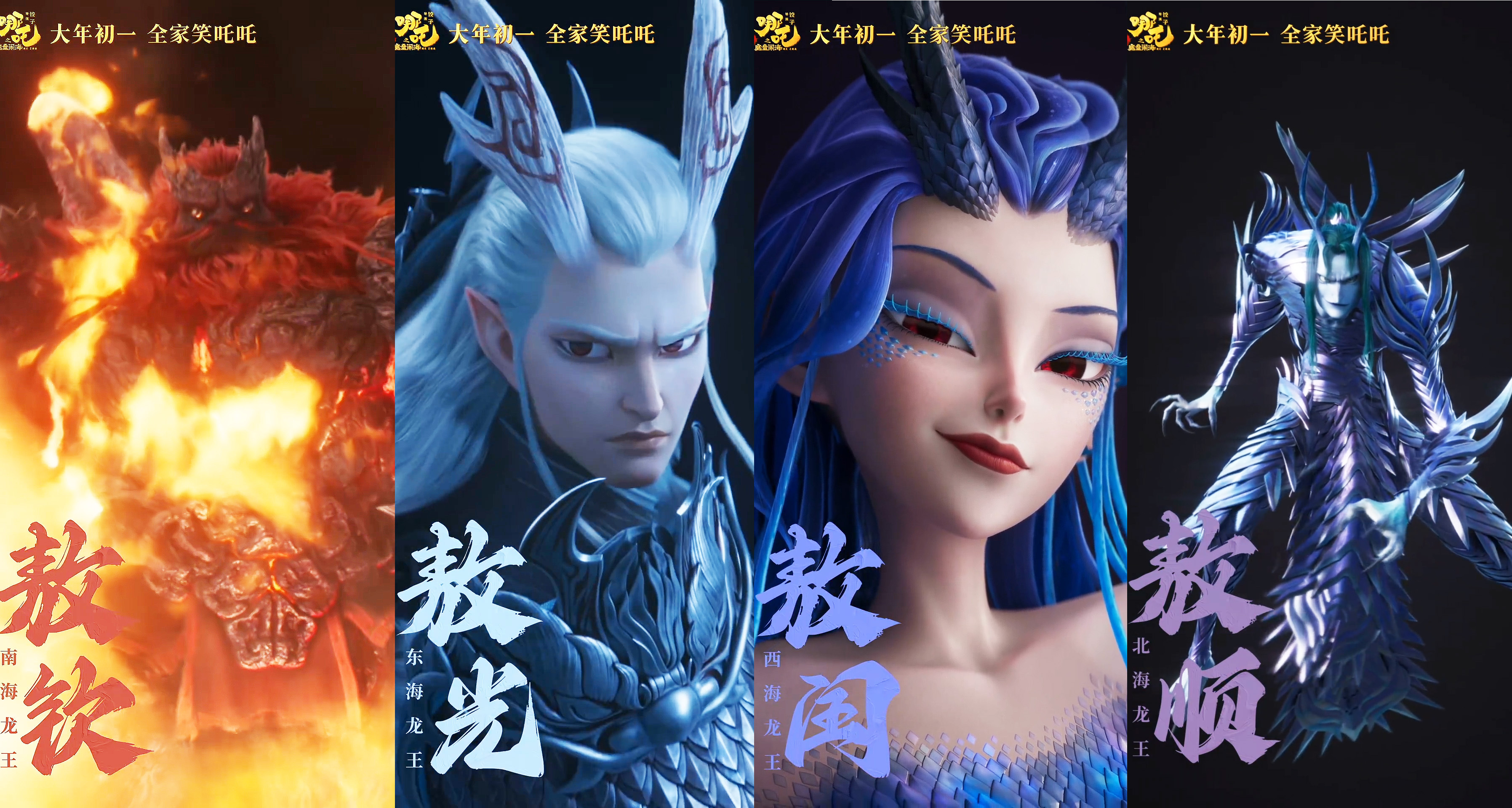| Páginas no assunto: < [1 2 3 4 5 6 7 8 9 10 11 12 13 14 15 16 17 18 19 20 21 22 23 24 25 26 27 28 29 30 31 32] > | “龙”的英文应该翻译成 Loong - 转发 (A Chinese Teacher Suggests that "Dragon" should be written as "Loong") Autor da sequência: Libin PhD
|
|---|
hj58
Local time: 01:27
Inglês
怕学生和同事嫌我唠叨,我上课或做报告只说一下我的建议和依据,并不翻来覆去说服谁。
我的观点当然正确,但是别人不认为正确,或者觉得旧译更好,或者更稳妥,我完全尊重他们的选择。
现在很多官媒和企业、大量个人,还有一些外国人已经改译龙为 loong,我和他们素不相识,足以说明我和志同道合者们的努力不是白费劲。
ysun wrote:
如果你的观点正确,难道还需要靠“话语权”来压服别人吗?
你连自己的同事、学生都说服不了,还想说服全世界? 
| | | | hj58
Local time: 01:27
Inglês
| 我想奥组委自己的说法应该最能反映龙落选奥运会吉祥物的真实原因 | Dec 6, 2024 |
ysun wrote:
“虽然龙的概念非常硬朗,但它有王权、皇族的特征”,这才是龙落选的主要原因。为什么你不提前半句最关键的理由,而只提后半句?那不是做学问的严肃态度。找论据,要分清主次,不要各取所需,不能只取对自己有利的论据,无视对自己不利的论据。
| | | | hj58
Local time: 01:27
Inglês
没有人响应时,你们说这证明我的建议是错的;有人响应了,你们又说人家是随波逐流。
实际上是英美人和海外华人译龙为 loong 在先,我只是碰巧也想到了 loong 而已。你们要嘲讽,去嘲讽两百多年前的英美人吧!
1817年,英国外交官音译“龙王庙”时,使用 loong;
1882年,美国传教士介绍中国文化时,译龙为 loong,而且写在文章标题里。
ysun wrote:
有人随波逐流,不等于那玩意儿就是对的
以“译龙为 loong”为时髦,与申请永动机专利的情况十分相似。
| | | | hj58
Local time: 01:27
Inglês
|
|
|
ysun 
Estados Unidos da América
Local time: 12:27
Inglês para Chinês
+ ...
hj58 wrote:
我的观点当然正确,但是别人不认为正确,或者觉得旧译更好,或者更稳妥,我完全尊重他们的选择。
现在很多官媒和企业、大量个人,还有一些外国人已经改译龙为 loong,我和他们素不相识,足以说明我和志同道合者们的努力不是白费劲。
你认为你的观点“当然正确”,但这里却几乎没人同意你的观点。你认为“现在很多官媒和企业、大量个人,还有一些外国人已经改译龙为 loong”,“花了一代人的时间,整整十八年,译龙为 loong 终于家喻户晓,被无数同胞认可”。但我认为,即使真的“被无数同胞认可”,也还远远不够。关键在于,“改译龙为 loong”的主张得让英语世界的广大民众普遍接受才能算数,否则你那十八年的努力就是在做无用功!
事到如今,你只不过是翻来覆去地重复你的观点,别人的意见你根本就听不进去。这种讨论再继续下去确实是浪费时间!前面我说过,“我认为“译龙为 loong”的讨论应该可以结束了。如果谁余兴未尽,不如到英语论坛再开一专题讨论,听听他们的意见吧!”所以,我建议你到英语论坛开一个“译龙为 loong”的专题继续讨论,听听他们的意见。不过,你得先做好被他们猛批的思想准备,否则就别多此一举了。
从根本上说,你就是认为 dragon 的形象丑陋恐怖,认为“中国人在西方人面前自称“Dragon”或“Descendants of the Dragon”(龙的传人(后裔)),西方人当然要把中国人看成是恶魔和坏人了”(引自本专题讨论第1页)。所以有外媒一针见血地指出,主张“译龙为 loong”,其实不是什么翻译问题,而是政治问题,是为政治服务。难怪连“胡叼盘”都会赶来蹭热度。请问,中国人真的就那么在乎自己的国际形象吗?不少中国人以做战狼为荣,还说“就做战狼又何妨?”既然“就做战狼又何妨”,那还在乎外国人把他们看成是“Descendants of the Dragon”吗?

其实早在18年前,Zhoudan 就已经把这个问题说得很透彻了:
https://www.proz.com/post/472412#472412
Zhoudan wrote:
还是前几天中央四台的一位新闻节目主持人说的好,哪怕你把龙改成小白兔、小绵羊,如果中国人做事不负责任,照样得不到别人的尊重。关键不在于用什么形象代表国家,而是国家表现出什么形象。
[修改时间: 2024-12-08 07:53 GMT]
| | | | ysun 
Estados Unidos da América
Local time: 12:27
Inglês para Chinês
+ ...
| 不要再翻来覆去地重复那些已被驳倒的陈旧观点了 | Dec 11, 2024 |
hj58 wrote:
没有人响应时,你们说这证明我的建议是错的;有人响应了,你们又说人家是随波逐流。
实际上是英美人和海外华人译龙为 loong 在先,我只是碰巧也想到了 loong 而已。你们要嘲讽,去嘲讽两百多年前的英美人吧!
1817年,英国外交官音译“龙王庙”时,使用 loong;
1882年,美国传教士介绍中国文化时,译龙为 loong,而且写在文章标题里。
ysun wrote:
有人随波逐流,不等于那玩意儿就是对的
以“译龙为 loong”为时髦,与申请永动机专利的情况十分相似。
我们干嘛要嘲讽两百多年前的英美人?人家并没把“龙”翻译成 loong 嘛!我前面讲得已经很清楚,1882年美国传教士在他那篇文章中,以“龙”字的发音 loong 来代表“龙”字,“但此句中逗号前的 dragon 才是'龙'字 translated 的结果”(see Grammatical analysis below)。换言之,loong 只是注音,dragon 才是'龙'字的翻译。同样,FOONG-SHOOY显然也是注音。
1817年,尽管那位英国外交官把“龙王庙”注音为“Loong-wang-Miao”,但我们不能就将此作为外国人把“龙”译为“Loong”的根据。如果你就此认为他把“龙”译成了“Loong”,那么我们是否也可把“王”一律译为wang,把“庙”一律译为“Miao”?假如可以的话,那就省事了,今后就用拼音字母 bopomofo 或 ㄅㄆㄇㄈ 来取代英文乃至一切外文就好了!
Grammatical analysis
2024-02-27
https://www.proz.com/post/3033256#3033256
ysun wrote:
hj58 wrote:
1809年,1814年,loong 的确是龙的注音。但是后来就被当作名词使用了,对应龙。例如 1882年美国传教士的一篇文章。
(See the second paragraph of the article)
PAGODA, LOONG AND FOONG-SHOOY1
BY REV. J. R. WALKER, SHAU-WU, CHINA.
......
The loong or dragon, as it is commonly translated, is to the Chinese nation all that the eagle is to us, and a great deal more.
尽管此文中以“龙”字的发音 loong 作为名词来代表“龙”字,但此句中逗号前的 dragon 才是“龙”字 translated 的结果。从语法上来分析,此句中 “ as it is commonly translated” 修饰的仅仅是逗号前的 dragon, it 这一代词则是指句首的 loong,即被翻译的对象“龙”。
这一句子相当于:The “龙” or dragon, as it is commonly translated, is to the Chinese nation all that the eagle is to us, and a great deal more.
退一步讲,假设 it 不是指句首的 loong,而 loong 就是“龙”字翻译的结果,那么 it 这一代词又是指代什么?
原文页末的注解还特别说明了 “oo” 应该如何发音:
1. Pronounced the oo as in moon, and the y short, as y final in city.
| | | | ysun 
Estados Unidos da América
Local time: 12:27
Inglês para Chinês
+ ...
| 实际上,该英国外交官将“龙王庙”译为“temple of the Dragon King” | Dec 11, 2024 |
hj58 wrote:
1817年,英国外交官音译“龙王庙”时,使用 loong;
下图引自黄佶著:“龙”被译为 dragon 和 loong 的详细过程(图5-14-2)
https://loong.ee/loong-1814-dragon-1815.html

显然,此图中的“Loong-wang-Miao” 是“注音符号”,紧跟在后的 “temple of the Dragon King”才是“龙王庙”的英译文。
请重温一下旧帖:
"Loong Wang Miao" 难道不是“注音符号”吗?
2024-05-04
https://www.proz.com/post/3040664#3040664
ysun wrote:
hj58 wrote:
“北京外国语大学英语学院副院长彭萍教授也讲得很清楚”,她是讲得很清楚,但是我研究得更清楚:早在 1817年,美国外交官在中国游记里音译龙王庙时就使用 loong 了,1882年美国传教士写文章介绍中国文化时,loong 这个单词写在文章标题里,都已经作为独立的单词使用了,还仅仅是“注音符号”?你可以去 Google books 里检索 loong,我就是在那里发现的,一分钟都不要。
黄佶著:“龙”被译为 dragon 和 loong 的详细过程
http://www.loong.cn/loong-1814-dragon-1815.html
5-14,龙被音译为 Loong 的历史溯源
......
在一本出版于 1817 年的书中(图5-14-2),作者把龙音译为 loong,第 257 页(图5-14-2下)第二段写道:“Boats, on reaching this place, usually offer up some sacrifice at the Loong-wang-Miao, or temple of the Dragon King: this was the first temple I had seen…”(开到此处的船只通常会在龙王庙奉献上一些祭品。这是我看到的第一个寺庙。……)。书中对“龙王庙”有两种表述,一是音译:Loong-wang-Miao,二是意译:temple of the Dragon King。

既然你说 Loong-wang-Miao 是音译,那不是“注音符号”又是什么?显然,文中的"temple of the Dragon King"才是龙王庙的英译文。
BTW, 此游记的作者 Henry Ellis 是一位英国外交官,而不是美国外交官。

| | | | hj58
Local time: 01:27
Inglês
北京奥组委负责吉祥物工作的一位专家就此进行了分析。他说,有的方案落选是因为在已举办过的奥运会中,已经使用过这些形象。虽然它们同样受到不少中国群众的喜欢,但缺乏新意,而不得不落选。这种类别的典型就是虎的造型。……。其二是“孙悟空”在中国是一个家喻户晓的文学作品形象,其故事几乎人人皆知,将此开发成奥运会吉祥物不利于对其内涵的定义和延伸�... See more 北京奥组委负责吉祥物工作的一位专家就此进行了分析。他说,有的方案落选是因为在已举办过的奥运会中,已经使用过这些形象。虽然它们同样受到不少中国群众的喜欢,但缺乏新意,而不得不落选。这种类别的典型就是虎的造型。……。其二是“孙悟空”在中国是一个家喻户晓的文学作品形象,其故事几乎人人皆知,将此开发成奥运会吉祥物不利于对其内涵的定义和延伸开发,故事难以有新意。第三类落选的热门方案,则是由于这一类形象中外理解上有歧义,而不得不放弃。其中最典型的就是中国龙的形象,龙是中国图腾中最重要的形象,但是由于龙在世界各地有着不同的理解,因此作为奥运会的吉祥物,也不得不忍痛割爱。
孙悟空中国龙等热门方案为何落选北京奥运吉祥物?
2005年11月11日20:59 新华网
其他人可以猜测原因。但是不等于奥组委的人是因为这些原因而否定了龙。
▲ Collapse
| | |
|
|
|
hj58
Local time: 01:27
Inglês
| 告诉大家一个好消息:哪吒海外版译龙为 loong 了 | Apr 5 |
太气人了!
| | | | hj58
Local time: 01:27
Inglês
| loong 都写在文章标题里了,还是注音? | Apr 5 |
loong 都写在文章标题里了,还是注音?注谁的音?注它前面 Pagoda 的音?
跟在汉字“龙”后面,你可以说是注音,跟在英文单词 dragon 后面注什么音?注 dragon 的音?跟在 dragon 后面就是同位语了。
ysun wrote:
1882年美国传教士在他那篇文章中,以“龙”字的发音 loong 来代表“龙”字,“但此句中逗号前的 dragon 才是'龙'字 translated 的结果”(see Grammatical analysis below)。换言之,loong 只是注音,dragon 才是'龙'字的翻译。同样,FOONG-SHOOY显然也是注音。
[Edited at 2025-04-05 10:59 GMT]
| | | | hj58
Local time: 01:27
Inglês
| 你们反对了十几年,最后螳臂当车,才是做了无用功。 | Apr 5 |
ysun wrote:
但我认为,即使真的“被无数同胞认可”,也还远远不够。关键在于,“改译龙为 loong”的主张得让英语世界的广大民众普遍接受才能算数,否则你那十八年的努力就是在做无用功!
罗马不是一天建成的。
当然是国内民众先使用,然后再外国人知道、使用。现在已经有大量年轻人在积极向外国人宣传 loong 了。
几个人影响了几亿人,这明明是有用功。
你们反对了十几年,最后螳臂当车,才是做了无用功。
| | | | ysun 
Estados Unidos da América
Local time: 12:27
Inglês para Chinês
+ ...
| Basic English grammar | Apr 6 |
hj58 wrote:
loong 都写在文章标题里了,还是注音?注谁的音?注它前面 Pagoda 的音?
跟在汉字“龙”后面,你可以说是注音,跟在英文单词 dragon 后面注什么音?注 dragon 的音?跟在 dragon 后面就是同位语了。
ysun wrote:
1882年美国传教士在他那篇文章中,以“龙”字的发音 loong 来代表“龙”字,“但此句中逗号前的 dragon 才是'龙'字 translated 的结果”(see Grammatical analysis below)。换言之,loong 只是注音,dragon 才是'龙'字的翻译。同样,FOONG-SHOOY显然也是注音。
[Edited at 2025-04-05 10:59 GMT]
Dear Professor Huang,
"The loong or dragon, as it is commonly translated" is equivalent to
"The ㄌㄨㄥˊ or dragon, as it is commonly translated", and equivalent to
"The 龍 or dragon, as it (龍) is commonly translated".
Therefore, we can come to the conclusion that the authors tried to explain that "The loong is commonly translated as dragon."
Grammatical analysis
2024-02-27
https://www.proz.com/post/3033256#3033256
ysun wrote:
hj58 wrote:
1809年,1814年,loong 的确是龙的注音。但是后来就被当作名词使用了,对应龙。例如 1882年美国传教士的一篇文章。
(See the second paragraph of the article)
PAGODA, LOONG AND FOONG-SHOOY1
BY REV. J. R. WALKER, SHAU-WU, CHINA.
......
The loong or dragon, as it is commonly translated, is to the Chinese nation all that the eagle is to us, and a great deal more.
尽管此文中以“龙”字的发音 loong 作为名词来代表“龙”字,但此句中逗号前的 dragon 才是“龙”字 translated 的结果。从语法上来分析,此句中 “ as it is commonly translated” 修饰的仅仅是逗号前的 dragon, it 这一代词则是指句首的 loong,即被翻译的对象“龙”。
这一句子相当于:The “龙” or dragon, as it is commonly translated, is to the Chinese nation all that the eagle is to us, and a great deal more.
退一步讲,假设 it 不是指句首的 loong,而 loong 就是“龙”字翻译的结果,那么 it 这一代词又是指代什么?
原文页末的注解还特别说明了 “oo” 应该如何发音:
1. Pronounced the oo as in moon, and the y short, as y final in city.
[修改时间: 2025-04-06 19:11 GMT]
| | |
|
|
|
ysun 
Estados Unidos da América
Local time: 12:27
Inglês para Chinês
+ ...
On Ritual and Legislation
Eric L. Hutton
European Journal for Philosophy of Religion 13 (2):45-64 (2021)
https://philpapers.org/rec/HUTORA
Abstract
Confucian thinkers have traditionally stressed the importance of li 禮, or “ritual” as it is commonly translated, and believed that ancient sages had established an ideal set of rituals for people to follow.
The pattern of "li 禮, or ‘ritual’ as it is commonly translated" is quite similar to that of "loong or dragon, as it is commonly translated".
In other words, "禮 is commonly translated as ‘ritual’" according to the author Eric L. Hutton, a philosophy professor and the Chair of the Department of Philosophy, University of Utah. However, it doesn't mean that we should translate 禮 as ‘li’.
If you open another thread to discuss the same topic about loon and dragon in the English forum, as I strongly suggested before, I would ask professor Eric L. Hutton to join the discussion if he is intereted. After all, your creation, "loong", must be accepted by majority of English speakers in the world before we can call your creation a great success.
Likewise, we can use the pattern "Loong-wang-Miao, or Temple of the Dragon King, as it is commonly translated".
By the way, in the sentence "The loong or dragon, as it is commonly translated...", the clause "as it is commonly translated" is not an apposition (同位语), but an adjective clause to modify the word 'dragon', while the pronoun it refers to "loong".
hj58 wrote:
loong 都写在文章标题里了,还是注音?注谁的音?注它前面 Pagoda 的音?
跟在汉字“龙”后面,你可以说是注音,跟在英文单词 dragon 后面注什么音?注 dragon 的音?跟在 dragon 后面就是同位语了。
[Edited at 2025-04-05 10:59 GMT]
| | | | ysun 
Estados Unidos da América
Local time: 12:27
Inglês para Chinês
+ ...
| Is that really "good news" to call them "Loong Kings"? Doesn't it mean self-demonization? | Apr 7 |
hj58 wrote:
告诉大家一个好消息:哪吒海外版译龙为 loong 了
太气人了!
Movie #Nezha 2 | The 4 Dragon (Loong) Kings |
https://www.youtube.com/watch?v=H8clar9w8o8

“Born of darkness, deception is second nature to me.” - Ao Shun, Loong King of Northern Sea
https://www.youtube.com/watch?v=9U5iFIJcdTI
Does anybody think these "Loong Kings" could represent P.R. China and the Chinese nation as a whole? If somebody does think so, doesn't it mean self-demonization (自我妖魔化)? I think these "Loong Kings" are exactly such "凶残的有翼巨兽、恶魔、悍妇" as you described in your article below. So, what sense does it make to translate 龙 as "loong", instead of dragon as it is commonly translated?
也谈“龙”的英文应该翻译成 Loong
黄佶(华东师范大学传播学院) 2006年3月22日
http://www.loongfeng.org/ye-tan-long-de-ying-wen-ying-gai-fan-yi-cheng-loong/
摘要:
“龙”不应该翻译成 dragon。Dragon 的本意是凶残的有翼巨兽、恶魔、悍妇等。中国人在外国人面前自称 dragon,是自我妖魔化。“龙”也不应该翻译成 long。Long 的英文发音不是“龙”,而是“狼”,这不是真正的音译。“龙”应该翻译成 loong......。
“Born of darkness, deception is second nature to me.” - Ao Shun, Loong King of Northern Sea
https://www.youtube.com/watch?v=9U5iFIJcdTI
Some Chinese people say that Ao Run, the Dragon Queen of the West Sea looks very charming and pretty. However, please read the description of Ao Run as follows:
Ao Run, “Loong Queen” of the West Sea
https://baike.baidu.com/item/敖闰/65326570
敖闰(Aorun),饺子执导的系列动画电影《哪吒》中的角色。妖娆妩媚,笑里藏刀,捉摸不透。
敖闰是敖光的妹妹、敖丙的姑姑。四海龙王中唯一的女性角色,低眉抬眸间美艳魅惑十足,充满神秘感,裙摆和龙鳍似水母摆动,能力是裂空爪,精明睿智、难以琢磨,是四海龙王中的智囊和策略家。
...助无量仙翁屠戮陈塘关。
Particularly, she assisted "Immortal Master" Wuliang in ambushing on Chentang Pass (陈塘关) and committing atrocities against its civilian population. Are these the types of vicious actions some Chinese people would publicly encourage and support? No wonder Shen Yi (沈逸), an International Relations Professor of Fudan University, would justify killings of civilians.
红十字国际委员会在《日内瓦公约》的《附加议定书》(第一议定书)之第五十条第一款中指出:“遇有对任何人是否平民的问题有怀疑时,这样的人应视为平民。(In case of doubt whether a person is a civilian, that person shall be considered to be a civilian.)” 显然,复旦大学国际关系学院“教授”沈逸根本就是一个国际法法盲!难怪复旦大学急于声明,说沈逸发表那些谬论是沈逸自己的“个人行为”,以免他败坏复旦大学的名声!沈逸的这个“教授”头衔大概也就是靠他叼盘叼了多年而混来的吧!不过他能混来个“教授”头衔也可以算是没做“无用功”吧!
https://zh.wikipedia.org/zh-hans/沈逸
人物评价
端传媒认为,观察者网自2016年开始重点推出沈逸,开始炒作他对美国政治的时评分析,显然是为了他的眼球效应,而非因为他的学术能力。沈逸素来在社交网络上出言不逊,善于调动情绪,虽然他作为专家学者不具有高超的水平,但作为流量明星,却可以迅速吸引大量看客,并由此为平台赚取流量和营收。[5]
[修改时间: 2025-04-07 20:44 GMT]
| | | | ysun 
Estados Unidos da América
Local time: 12:27
Inglês para Chinês
+ ...
| The Vicious "Loong King" of the Eastern Sea | Apr 16 |
hj58 wrote:
告诉大家一个好消息:哪吒海外版译龙为 loong 了
太气人了!
Let's put the above grammatical analysis aside for now as it's very easy to understand. Let's talk about the atrocities the Loong Kings committed against civilian population in the town of Chentang Pass.

Loong King of the Eastern Sea: "If I go to war, Chentang will be reduced to ashes! Not a soul shall remain!"

That means the Loong King of the Eastern Sea will kill all the civilians in the town without mercy even on a dog and a chicken (鸡犬不留)! Would you please tell us if this Loong King could be the symbol of the Chinese nation and the Chinese culture as you defined?
If your answer is Yes, that's truly "太气人了!" since self-demonization would make the Chinese people extremely mad!
If your answer is No, how do you explain what you described in your article below?
也谈“龙”的英文应该翻译成 Loong
黄佶(华东师范大学传播学院) 2006年3月22日
http://www.loongfeng.org/ye-tan-long-de-ying-wen-ying-gai-fan-yi-cheng-loong/
摘要:
“龙”不应该翻译成 dragon。Dragon 的本意是凶残的有翼巨兽、恶魔、悍妇等。中国人在外国人面前自称 dragon,是自我妖魔化。“龙”也不应该翻译成 long。Long 的英文发音不是“龙”,而是“狼”,这不是真正的音译。“龙”应该翻译成 loong。
......
“龙”是中华民族的象征,在中译英时,“龙”被翻译成 Dragon。但是在英文中,dragon 是邪恶的有翼怪物,还有“凶暴的人,悍妇”等含义。在图画中,dragon 的身躯庞大笨拙,颜色是黑灰色的,长着巨大的翅膀,口中吐火,吞噬人和动物,非常丑陋恐怖,和中国的龙完全两样。
中国人在西方人面前自称“Dragon”或“Descendants of the Dragon”(龙的传人(后裔)),西方人当然要把中国人看成是恶魔和坏人了。所以我们再也不能把“龙”翻译成“Dragon”了!
......
The loong is a spiritual tie linking the Chinese people. The loong, as the symbol of the Chinese nation, has become part of the Chinese culture. Chinese people are proud to call themselves “the offspring of the Loong”.
The loong is translated as “dragon” wrongly now. In fact, loong is so different in nature from Western Dragons that it may be more reasonable to consider them as dissimilar creatures, rather than as the same creature interpreted differently.
(2) used to be the symbol of Chinese kings, they were called “the son of the Loong”.
[修改时间: 2025-04-16 14:37 GMT]
| | | | | Páginas no assunto: < [1 2 3 4 5 6 7 8 9 10 11 12 13 14 15 16 17 18 19 20 21 22 23 24 25 26 27 28 29 30 31 32] > | To report site rules violations or get help, contact a site moderator: You can also contact site staff by submitting a support request » “龙”的英文应该翻译成 Loong - 转发 (A Chinese Teacher Suggests that "Dragon" should be written as "Loong") | LinguaCore | AI Translation at Your Fingertips
The underlying LLM technology of LinguaCore offers AI translations of unprecedented quality. Quick and simple. Add a human linguistic review at the end for expert-level quality at a fraction of the cost and time.
More info » |
| | Trados Studio 2022 Freelance | The leading translation software used by over 270,000 translators.
Designed with your feedback in mind, Trados Studio 2022 delivers an unrivalled, powerful desktop
and cloud solution, empowering you to work in the most efficient and cost-effective way.
More info » |
|
| | | | X Sign in to your ProZ.com account... | | | | | |











